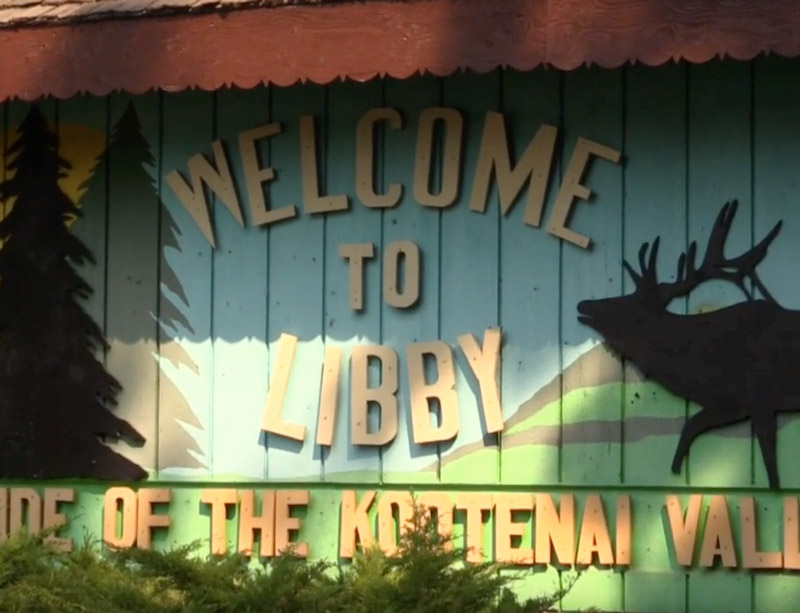Libby Protects Those with Asbestos Disease from COVID-19

No town in America has a higher percentage of asbestos-related lung disease — and resulting respiratory issues — than Libby, Montana, making its population uniquely vulnerable to the COVID-19 pandemic.
Yet no town has responded to the threat so effectively.
The home of the longest-running man-made environmental disaster in U.S. history — the mining of toxic asbestos for 70 years — has refused to let COVID-19 dictate who lives and who dies.
The Center for Asbestos Related Disease, also known as CARD, has stepped up and taken charge.
“We can’t afford to let the virus get loose here because of the number of high-risk individuals we have,” Dr. Brad Black, medical director at CARD, told The Mesothelioma Center at Asbestos.com. “You’re not going to stop it. We know that. It will go through your population, but we want to contain it. And I think we have, to this point.”
COVID-19 Not Spreading in Libby
Libby is the county seat of rural Lincoln County, where more than 3,000 residents — about 15% of the total population — have been diagnosed with respiratory diseases like mesothelioma that seriously compromise the immune system. They are of particular risk for coronavirus complications.
Yet according to the Centers for Disease Control, just seven people in Lincoln County have been diagnosed with COVID-19. The only fatality is a 70-year-old man who contracted the disease in California before returning to his vacation home in northwest Montana.
The other six diagnosed are back to full health, according to Black.
“I think we’ve been lucky. We’re out West, with lots of space. No subways or tight quarters. We’ve been able to stay on top of the ones who did show up with the virus,” Black said. “And we haven’t seen any in our most recent testing of maybe 600 to 700 people.”
CARD is a community nonprofit health organization that evolved from the raised awareness of the widespread asbestos-related diseases that have been such a part of Libby-area health care for decades.
The staff today includes doctors, nurses, respiratory therapists, a physician’s assistant and researchers, all specialists in asbestos disease.
CARD was first formed in 2000, dedicated to the diagnosis and long-term care of patients with asbestos-related diseases. It has expanded to include academic research that has led to worldwide diagnostic and treatment advances.
Asbestos Disease Part of Libby Identity
Almost 500 people have died in the small town of Libby from asbestos disease — both former miners and nearby residents — and thousands more are sickened with respiratory illnesses.
The U.S. Environmental Protection Agency designated the situation in Libby a public health emergency in 2008.
Although the mine was closed in 1990, new victims still are being diagnosed today. Those affected by asbestos diseases, such as mesothelioma cancer, can take 20 to 50 years to begin showing obvious symptoms.
“It’s a long-term issue here,” Black said. “People sometimes forget that, and don’t understand the lag time between long-ago exposure and disease today. It’s something you always have to be aware of here.”
CARD Staff Started Aggressive Testing
The CARD office, where patients were seen regularly, was closed in mid-March for fear of spreading coronavirus, but the staff immediately spearheaded a drive-thru COVID-19 testing station in its parking lot.
Working with the county health department, the staff wanted early identification of the disease to prevent the spread. Both symptomatic people and those without symptoms were tested. Residents working in essential industries, such as grocery stores, were especially encouraged to be tested.
“It was, and still is, a screening program for all,” said Black, a former hospital emergency room physician who has been a Lincoln County health officer since 1984. “We wanted to monitor any spread in the community, and we’re still doing it.”
The goal is to test more than 1,000 residents each month. While the CARD clinic reopened to patients on May 11, Lincoln County health workers have continued the drive-thru testing in the CARD parking lot.
“Right now we feel pretty confident the virus isn’t spreading here, but that’s going to change. We’ll see a lot of out-of-town visitors this summer,” said Black. “So it’s coming, but we want to be ready for it. We’ll stay on top of the testing and make sure we’re prepared.”
At 459 confirmed cases, Montana is one of just four states with fewer than 1,000 cases of coronavirus in 2020. The others are Wyoming (669), Hawaii (582) and Alaska (381).
“We’re trying to do all the things we can to reduce the risk to the most vulnerable members of the population here,” said Black. “To this point, it’s been successful. We’re confident that we can stay on top of it and protect the high-risk individuals we have.”